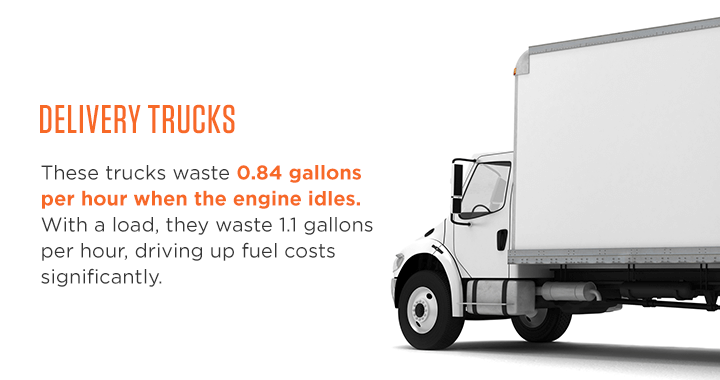

Fleet managers and companies often overlook engine idling, but it can account for thousands of dollars in unneeded costs for businesses that operate fleets of vehicles. Idling eats up gas, and as a result, raises costs. The larger your fleet, the more money you could be wasting from fuel loss and performing maintenance operations due to engine damage. Besides impacting your fuel efficiency and vehicle performance, engine idling can harm the environment by putting more harmful toxins into the air.
To save your company money and reduce idling waste, it’s crucial you know what engine idling is and how it can raise your costs.
A vehicle is idling when the engine is running, but the vehicle isn’t moving. Engine idling is a fairly common occurrence, as it naturally occurs throughout the day when you’re waiting in traffic or stopped at a light. Because engine idling can waste fuel and harm a vehicle’s engine, many drivers and companies that employ drivers look for ways to reduce idling time.
Some people wrongly assume that turning off your engine and starting it back up will actually waste more fuel than just leaving it on. In fact, leaving your engine on while idling for longer than 10 seconds will generate a greater number of greenhouse gasses and use more fuel than simply turning it off and starting it back up later. Since idling wastes fuel so quickly, it’s no wonder that companies and individuals hope to reduce engine idling.
Since even 10 seconds can lead to a greater waste of gas, it’s important to understand how much gas you waste while your fleet’s engines’ idle to calculate how much money your company is wasting on unnecessary fuel costs every year.

One study calculated how much gas a vehicle wastes when idling, depending on its type, class and size. Some of the primary examples of gas waste include:

Besides wasted gas and increased fuel-costs, there are plenty of other negative effects that can come from engine idling. For instance, when an engine idles for a prolonged period of time, it can end up causing chemicals to build up in the engine that can then lead to mechanical degradation and even more fuel consumption. Idling also puts dangerous chemicals into the air that can lead to poor air quality and environmental damage.
Damage to the engine can be even more pronounced, with engine idling potentially damaging the Diesel Exhaust Fluid filter or the Engine Gas Recirculation valve. Additionally, airflow into the engine is significantly hampered while idling, leading to unstable engine temperature. Along with airflow concerns, idling can cause your engine to have dirty oil that harms your diesel exhaust fluid (DEF) filter, leading to reduced vehicle performance and greater gas emissions.
Engine idling will happen, but it doesn’t have to happen often if you take appropriate action and establish good habits. Companies can get around these negatives by following the tips listed below:
If you’re ready to take control of your fleet’s fuel costs and waste, you should start with GPS tracking devices from Track Your Truck. When you work with our company, you get unparalleled benefits that can take your company’s fleet to the next level. Our GPS tracking devices and software can be customized to track vehicle idling time to give you all the information you need to make a change.
Explore our GPS tracking devices and request a quote today. If you have any questions, feel free to call us at 855-350-3496.